PHOTO: picture alliance / Contributor
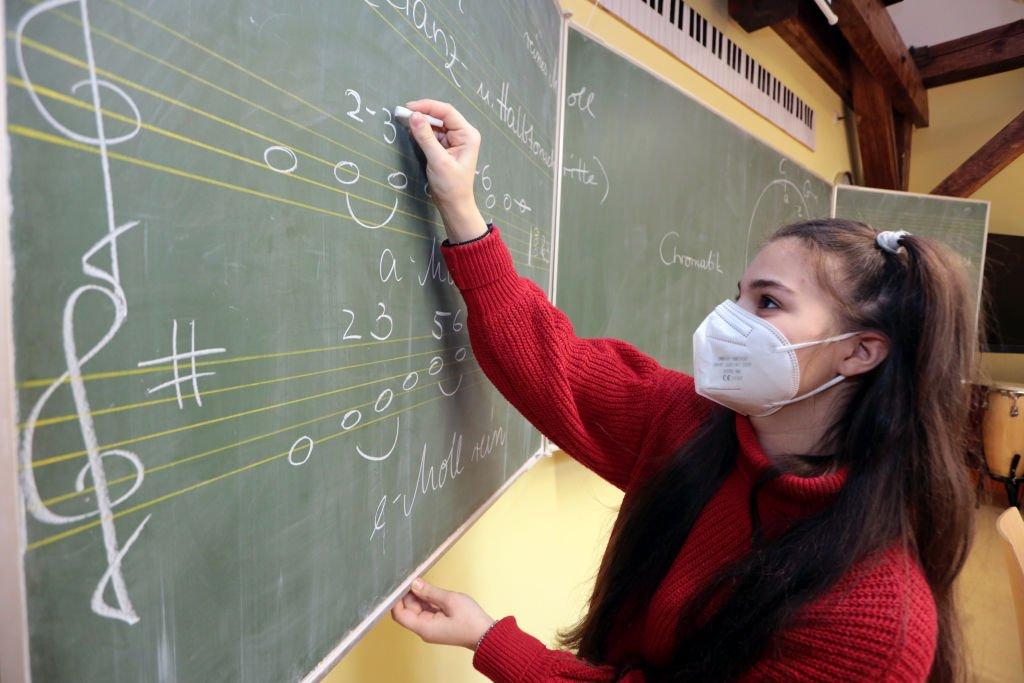
interview
5 Music Teachers Share The Transformative Power Of Music Education
Music education draws passionate instructors — who are often multi-disciplinary musicians themselves — into a rewarding field. Five music teachers detail the importance of and challenges around music education, as well as opportunities for innovation.
For centuries, music education has been noted for positively increasing students’ greater holistic learning and lifestyle outcomes, yet music education across the United States in public and private settings has faced a stark decline in the past several decades.
Bearing witness to this, a new wave of music entrepreneurs, performers, content creators and instructors are taking the music education space by storm. These instructors are leveraging various forms of technology and their personal social platforms to tell inspiring stories about their journeys and share their best practices within the field. Their work has inspired a new wave of learning in-person, virtually and through hybrid methods.
Below, five artists-turned-educators discuss their inspiration for becoming teachers, the importance of music education, challenges they have witnessed within the field, and innovative ways that music education can evolve in the future.
Darlene Machacon: Elementary general music teacher, choir director, podcaster
Practicing: 20+ years
Teaching: 10+ years
Instruments: Piano, general music, choir
Location: Garden Grove, CA
Darlene Machacon was inspired to teach music by the train scene in the movie The Chronicles of Narnia: "The film composer scored a beautiful musical moment that instantly inspired me to want to make music for the rest of my life," she told GRAMMY.com. Today, she teaches elementary general music for kindergarten through sixth grade, and directs fifth and six grade choir.
Machacon believes "music is essential because it is all around us," and aims to dismantle the idea that music education is limited to learning how to read traditional notation. "Our youth deserve music education that connects them to what they experience outside classroom walls and challenges them to make a positive impact in their communities," Machacon says.
While this journey has been enjoyable, Machacon notes that music educators are often expected to work beyond contract hours and experience a lack of work-life balance. They often take on larger class sizes, earn lower pay and encounter the perception that music is not a "real" subject. Despite these challenges, Machacon sees a shift in elementary general music classes away from "singing from old school textbooks and reading notes" to creating immediate and relevant connections to keep students interested outside of school performance ensembles.
These connections could include opportunities to play in rock and pop bands, Machacon suggested. While classes for music production and design could pave the way for sound designers, music producers, video music creators and their peers.
Ian Levy: Assistant professor, hip-hop scholar
Practicing: 20+ years
Teaching: 10 years
Instruments: Trumpet, emcee
Location: New York, NY
Ian Levy recalls being introduced to hip-hop and emceeing as a tool for self-expression and emotional development in college. He then turned to hip-hop-based interventions as a school counselor, using lyric writing, recording and performing as therapeutic tools. In youth-created recording studios, Levy’s students share emotional experiences and systemic injustices by writing and releasing songs, and creating album artwork and music videos.
And while this work creates a culturally sustaining counseling service, helping youth develop stress coping skills and emotional self-awareness, Levy's methodology has often come into question. Some faculty perceive these courses as the students "just having fun."
"Education tries to define how youth should sound and develop, often in misalignment with who they truly are," Levy says in rebuttal. "A challenge for hip-hop in school counseling is supporting youth in trusting their ways of knowing and being able to live authentically in a world that limits self-actualization."
In the long run, Levy believes music education must transcend beyond purely teaching music and be leveraged as a counseling and teaching tool in various subject matter classrooms.
Ashley Keiko, Music school owner, performing/recording artist
Practicing: 20+ years
Teaching: 15+ years
Instruments: Piano, saxophone, flute
Location: Queens, NY
Ashley Keiko ventured into music at the behest of her parents, educators who owned a martial arts studio. Keiko was heavily involved in the studio and, one day, her mother encouraged her to provide piano lessons to a student. Word spread quickly, and Keiko's student population increased. By age 25, Keiko owned and ran her own school, Keiko Studios in Jamaica, New York.
Keiko's work has evolved dramatically over the years. "For many years I taught private piano/saxophone lessons to students of all ages and recalled being hands-on with my teaching style at countless schools, concert and jazz bands, general music ed, choir and more," she says. "Now, I oversee 14 instructors with over 130 students and focus on big picture projects."
Yet Keiko is challenged by the lack of others understanding the value of music educators' time and music education as a whole. She hopes that having more conversations about music education will change its perceived value. She finds resolve through creative means, incorporating more accessible technology into the music education experience. With countless music websites, apps, and software, Keiko believes the learning process for students can be more enjoyable and productive.
Brandon Toews, Content Director at Drumeo
Practicing: 15+ years
Teaching: 5+ years
Instruments: Drums, percussion
Location: Abbotsford, British Columbia
Brandon Toews' private music instructors inspired him to branch into music education. When he began working for an online drum education company, Drumeo in 2014, Toews witnessed the exponential global impact music education could have at scale. For the past seven years, Toews has filmed educational content for Drumeo, working with many of the world’s top drummers including Dennis Chambers, Simon Phillips, Jay Weinberg, Hannah Welton and Steve Smith.
While he believes that "music education is key in creating more musicians around the world and helping them find their unique voices," Toews has been challenged to create content that serves and connects those with different learning styles.
Each of Drumeo's approximately 30,000 students learns differently, he notes. To this end, the platform utilizes "step-by-step video courses to conceptual videos focused on creativity and musicality, or digital tools and technology for practicing exercises with notation."
Toews finds that music education can be innovative by becoming more engaging, fun and increasing the practice tools and applications available for musicians. "Information is so widely available, but effective practice tools are still few and far between," he says.
Kate Warren, Freelance performer, educator
Practicing: 15 years
Teaching: 4 years
Instruments: French Horn, trumpet
Location: New Haven, CT
"Growing up, regular lessons were not something my family could afford," Kate Warren says. "Because of that, anything I learned outside of the classroom came from pedagogy books, blog posts, podcasts, and YouTube." Using those resources increased her interest in giving back to the field.
To date, Warren has maintained a private studio, written a book on french horn pedagogy, run a music-education focused social media page and taught marching band. Her most recent project is a beginner french horn video series for students through a partnership with instrument manufacturers Conn & Selmer.
Warren has found that music education can provide students with "healthy outlets, lifelong friendships, and critical life skills." However, she’s witnessed that gender representation is still an issue in music — especially in brass playing.
To provide an informed solution she is conducting research to help institutions diversify their hiring processes. Warren has also found social media to be influential in changing the way young people interact with and seek learning experiences by disseminating creators’ knowledge and experiences more freely.
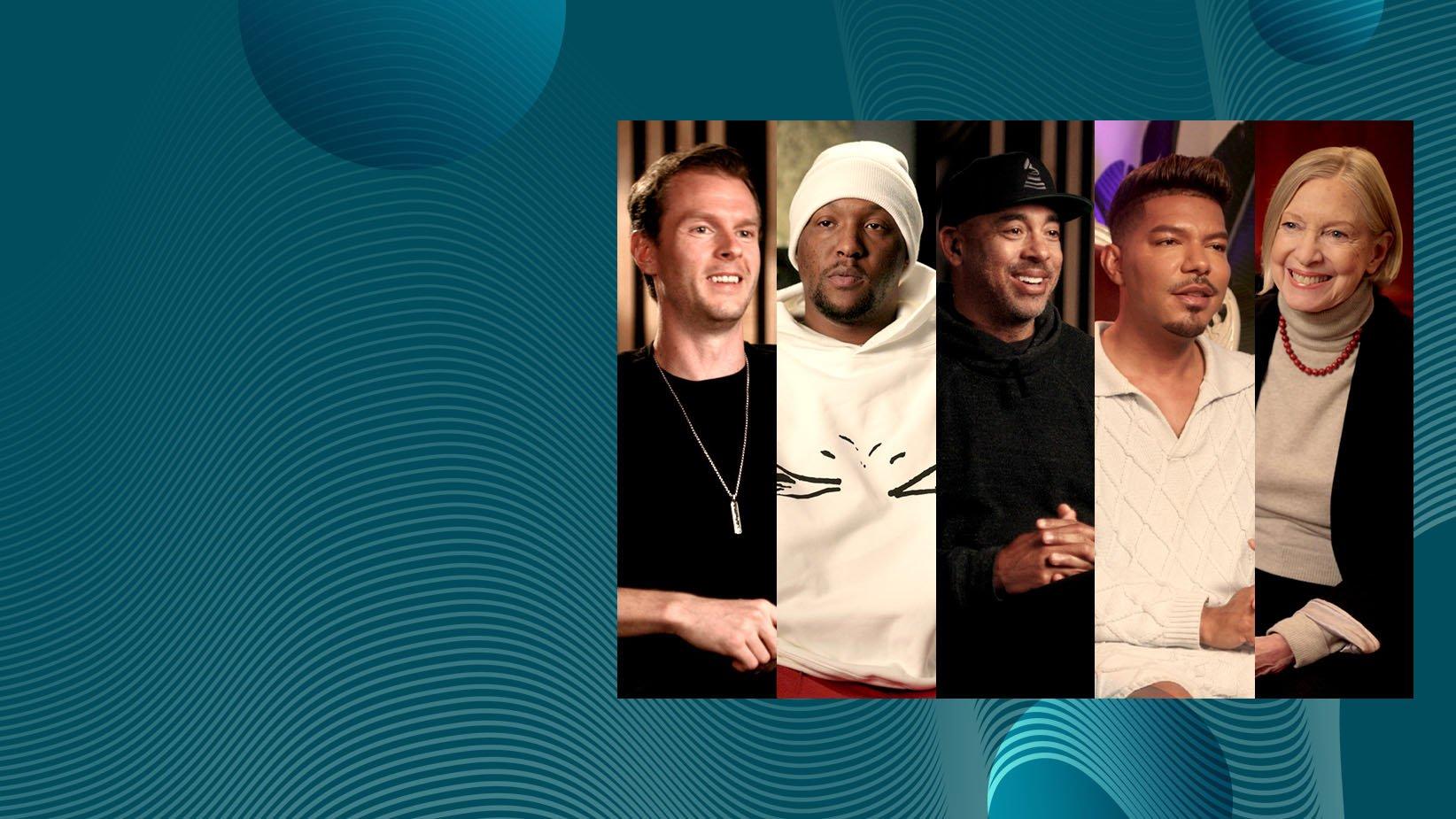
Photos Courtesy of the Recording Academy
news
The New GRAMMY GO Music Production Course Is Now Open: Featuring GRAMMY Winners Hit-Boy, CIRKUT, Judith Sherman & More
Enrollment is now open for GRAMMY GO's new specialization, "Music Production: Crafting Award-Worthy Songs," featuring appearances by GRAMMY winners and nominees. Learn music production and creative strategies from today's industry leaders.
Editor’s Note: Updated to add the Instagram Live video featuring Harvey Mason jr. and Stevie Mackey.
The Recording Academy continues its mission to empower music's next generation with the launch of its second specialization in the GRAMMY GO platform: "Music Production: Crafting Award-Worthy Songs."
This new course, a partnership between the Recording Academy and leading online learning platform Coursera, aims to bolster the technological and audio skills of music producers of all levels. The course, taught by Howard University professor and GRAMMY nominee Carolyn Malachi, features appearances by three-time GRAMMY winner and rap icon Hit-Boy, chart-topping and GRAMMY-winning producer/songwriter CIRKUT, artist and celebrity vocal coach Stevie Mackey, five-time GRAMMY nominee and Recording Academy CEO Harvey Mason jr., and 15-time GRAMMY winner Judith Sherman.
Enrollment for "Music Production: Crafting Award-Worthy Songs" is open now.
Mixing a unique blend of theory and practice, the course teaches music creators of all levels the advanced skills and tools to develop the mindset and confidence of an experienced producer and produce songs of the highest industry standards across all genres. Explore the wide-ranging roles of a music producer, develop critical listening and analysis skills, and master the technical aspects to create music and compositions that cut through the noise. The course's applied learning approach allows learners to sharpen their pre-production skills, utilize Digital Audio Workstations (DAWs) effectively, and produce vocals, instrumentals and samples collaboratively. Through critical listening exercises and discussions, learners will refine their abilities to deliver professional-quality demos.
To celebrate the launch, the Recording Academy hosted an Instagram Live session on Tuesday in which guests Harvey Mason jr. and Stevie Mackey discussed the evolving role of music producers, strategies for working with artists, key elements of top-notch productions, common mixing mistakes, tips for keeping the creative process fresh, and enrollment details for the course.
Building on the success of its first specialization, "Building Your Audience for Music Professionals," GRAMMY GO continues to offer industry-focused education tailored for emerging and established music creators and professionals alike. The innovative platform provides learners with real-time insights from leading music industry figures, ensuring the content remains practical and up to date. GRAMMY GO will also serve as an essential tool in the Recording Academy's global expansion into Africa and the Middle East, empowering music creators through enhanced training, bridging knowledge gaps, and fostering connections within the global music community.
Launched in April in partnership with Coursera, GRAMMY GO is the Recording Academy's first creator-to-creator platform, offering innovative courses tailored for both emerging and established music professionals. The initiative accelerates the Academy's global mission and reinforces its commitment to music education, providing a seamless bridge between all Academy initiatives.
Learn more about GRAMMY GO and the "Music Production: Crafting Award-Worthy Songs" and "Building Your Audience for Music Professionals" specializations.
Watch the Instagram Live session with Harvey Mason jr. and Stevie Mackey in full below:
More Music Education News & Initiatives
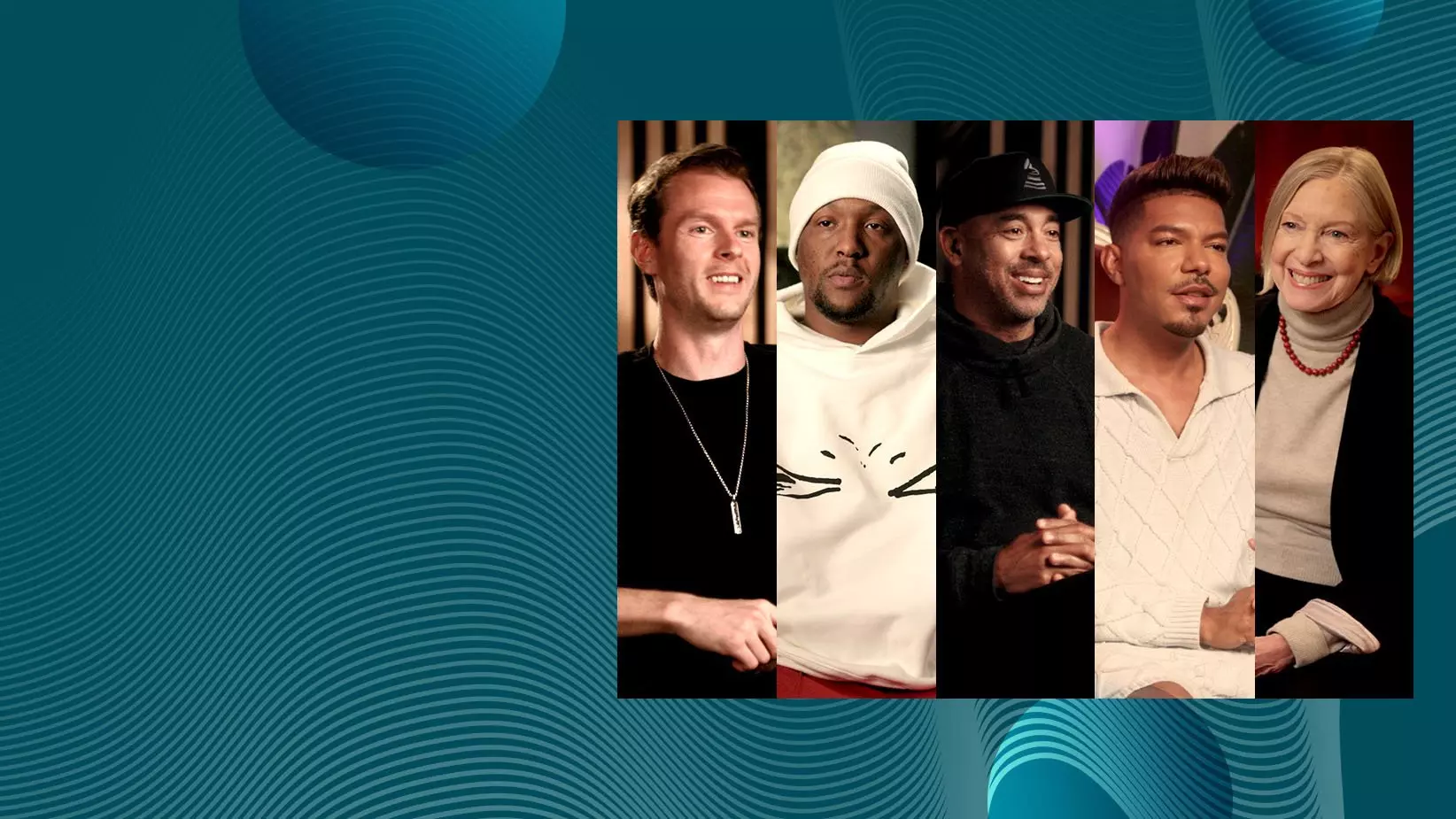
The New GRAMMY GO Music Production Course Is Now Open: Featuring GRAMMY Winners Hit-Boy, CIRKUT, Judith Sherman & More
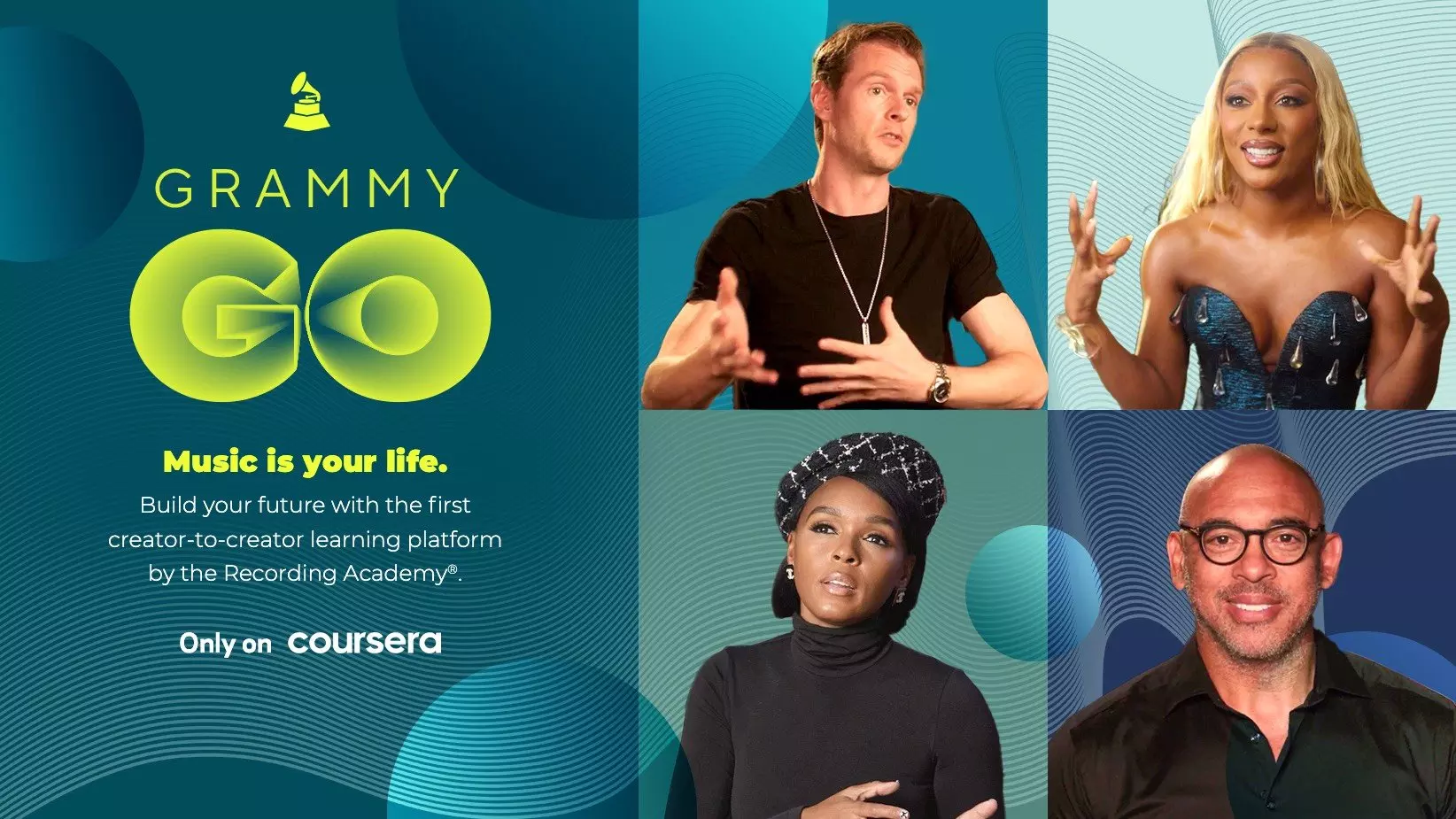
Recording Academy & Coursera Partner To Launch GRAMMY GO Online Learning Initiative
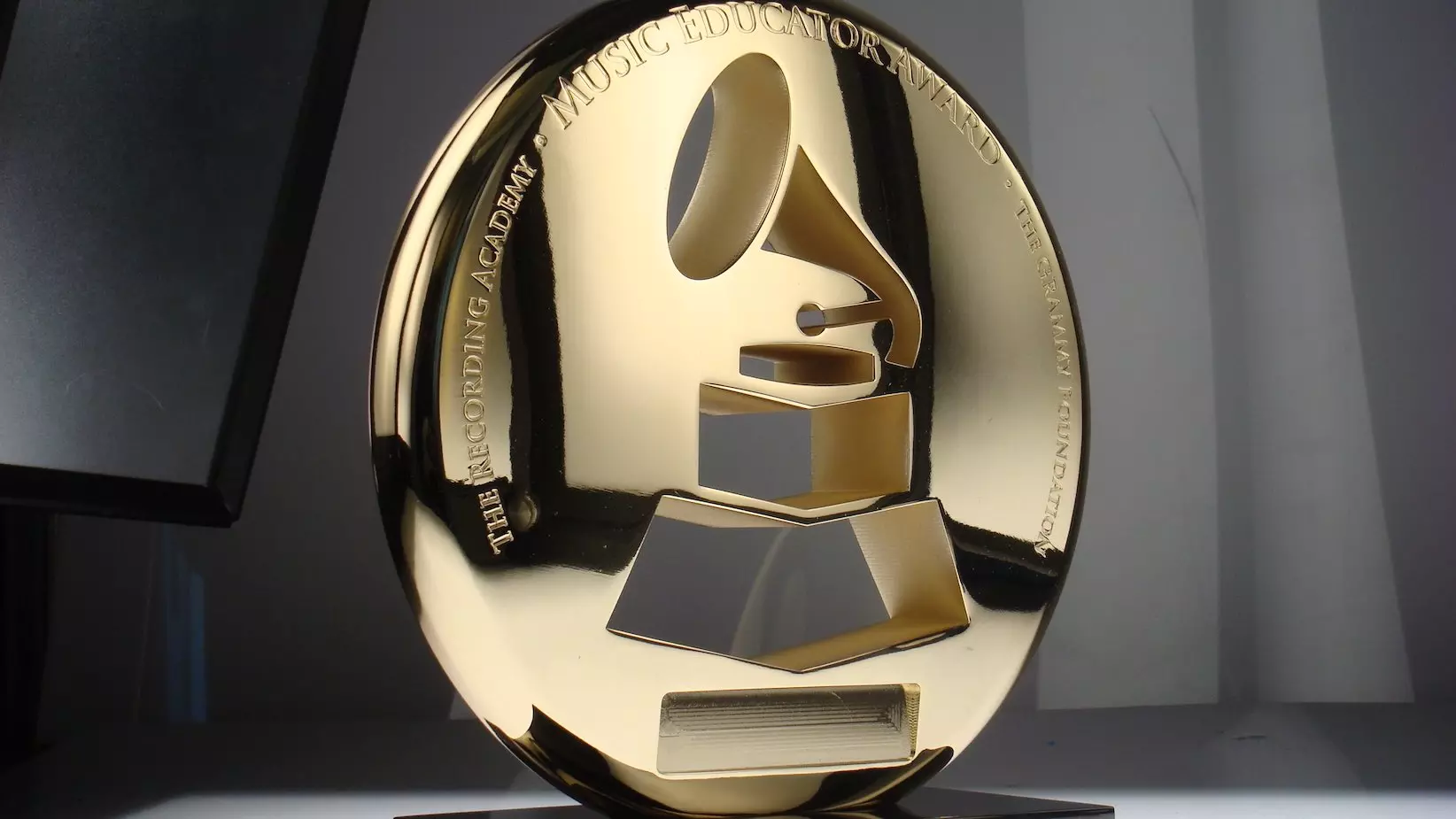
25 Semifinalists Announced For The 2024 Music Educator Award
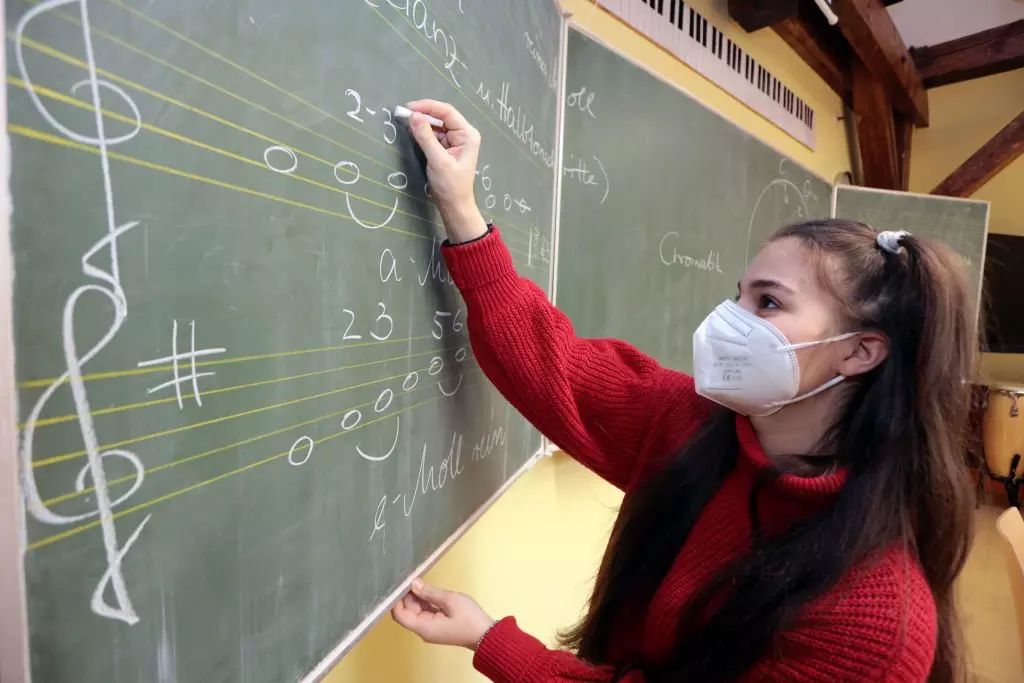
5 Music Teachers Share The Transformative Power Of Music Education
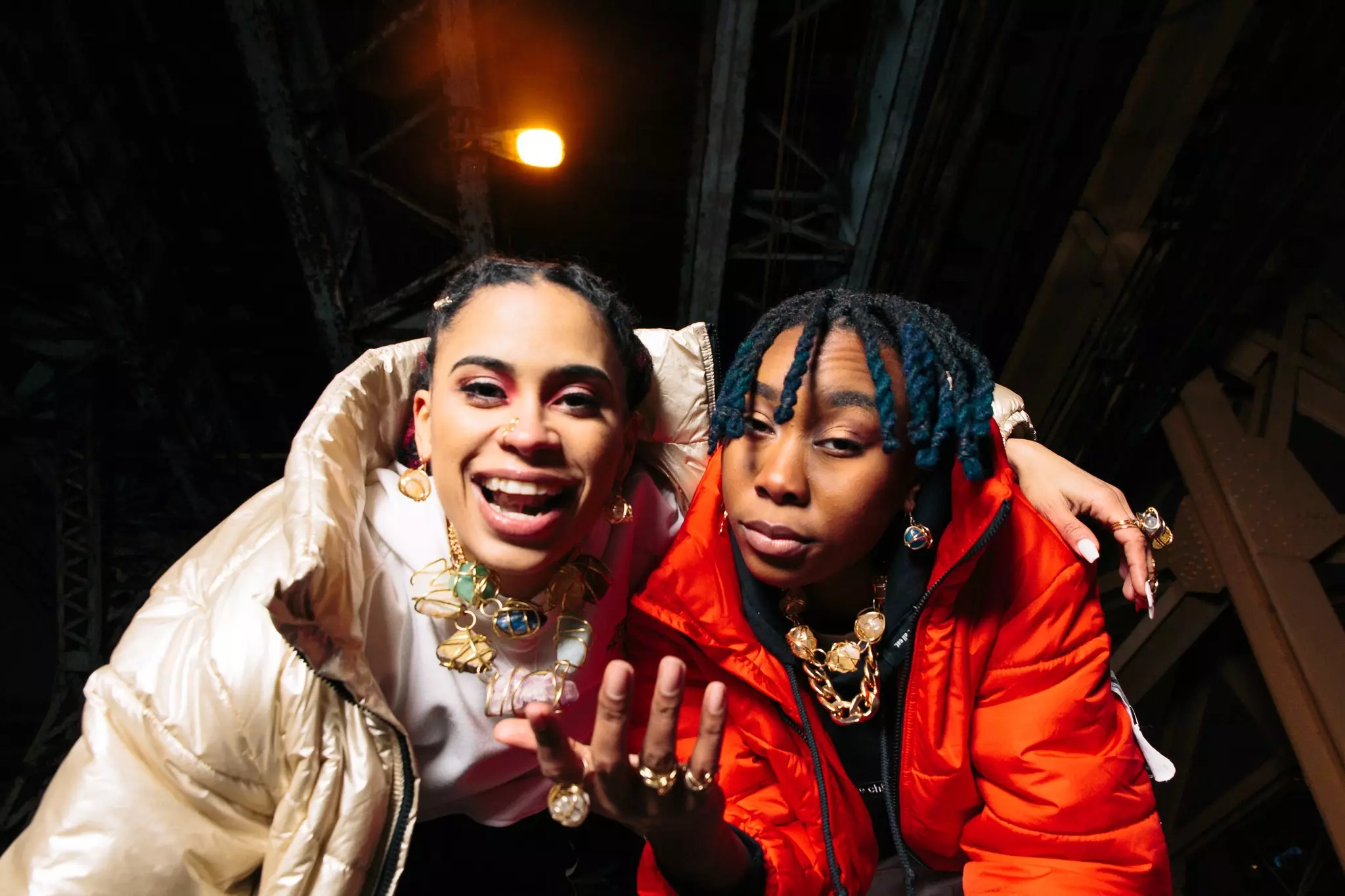
Meet Mother Nature, The Chicago Rap Duo That Teach & Live Self-Expression Through Their Miseducation Of HipHop Youth Workshops
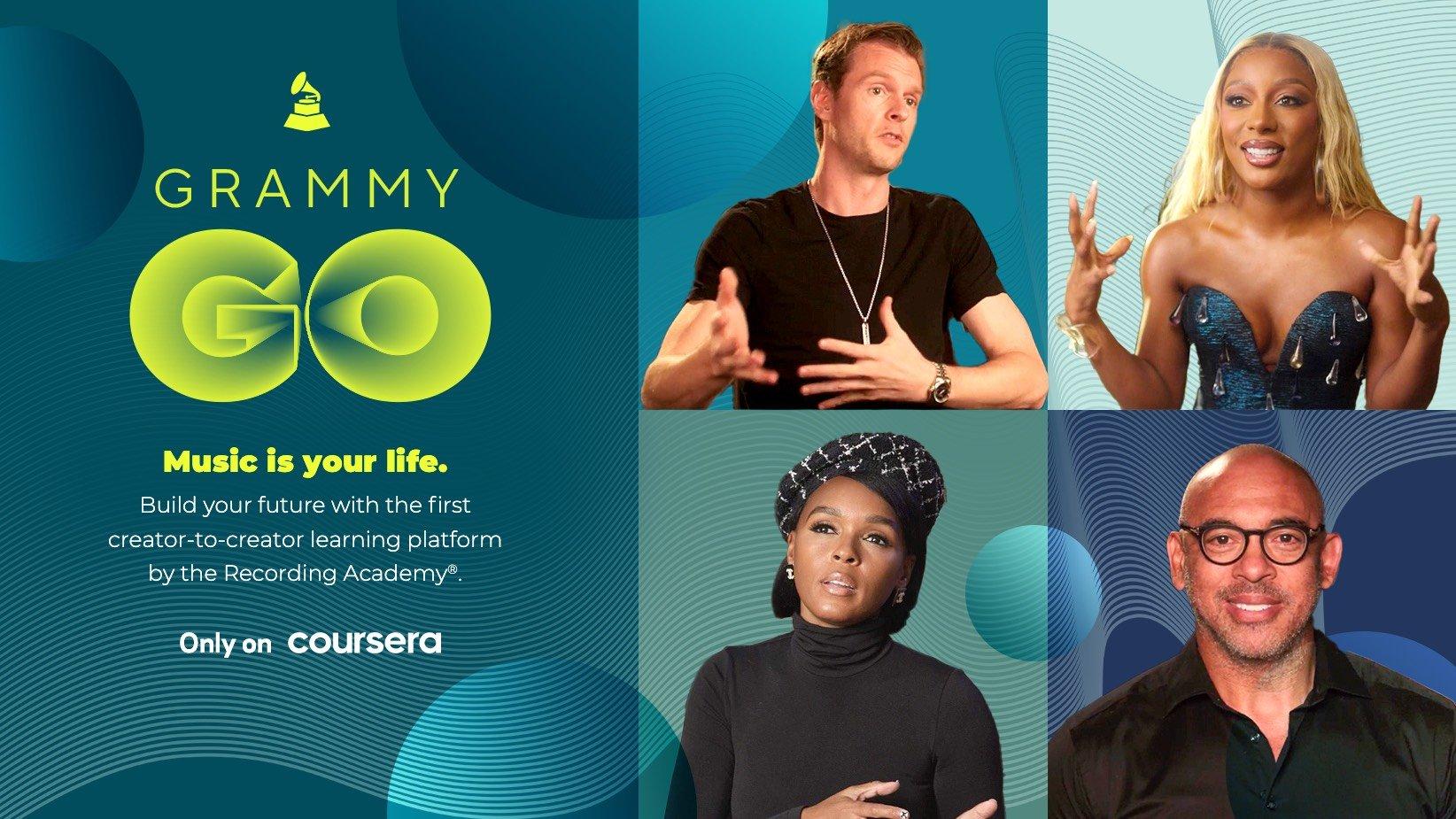
Graphic & Photos Courtesy of GRAMMY GO
news
Recording Academy & Coursera Partner To Launch GRAMMY GO Online Learning Initiative
Class is in session. As part of the Recording Academy's ongoing mission to empower music's next generation, GRAMMY Go offers digital content in specializations geared to help music industry professionals grow at every stage of their career.
The Recording Academy has partnered with leading online learning platform Coursera on GRAMMY GO, a new online initiative to offer classes tailored for music creators and industry professionals.
This partnership empowers the next generation of the music community with practical, up-to-the moment digital content that provides wisdom for both emerging and established members of the industry. Continuing the Academy’s ongoing mission to serve all music people, courses cover a variety of specializations tailored to creative and professional growth.
GRAMMY GO on Coursera includes courses taught by Recording Academy members, featuring GRAMMY winners and nominees and offers real-life lessons learners can put to work right away.
Starting today, enrollment is open for GRAMMY GO’s first Coursera specialization, "Building Your Audience for Music Professionals," taught by Joey Harris, international music/marketing executive and CEO of Joey Harris Inc. The course features Rock & Roll Hall of Fame inductee and five-time GRAMMY winner Jimmy Jam, 10-time GRAMMY nominee Janelle Monáe and three-time GRAMMY winner and the 2024 GRAMMYs Best New Artist Victoria Monét. This foundational specialization will help participants gain the skills, knowledge and confidence to build a strong brand presence and cultivate a devoted audience within the ever-changing music industry.
The partnership’s second course, launching later this summer, aims to strengthen the technological and audio skills of a music producer. "Music Production: Crafting An Award-Worthy Song" will be taught by Carolyn Malachi, Howard University professor and GRAMMY nominee, and will include appearances by GRAMMY winner CIRKUT, three-time GRAMMY winner Hit-Boy, artist and celebrity vocal coach Stevie Mackey, five-time GRAMMY nominee and Recording Academy CEO Harvey Mason jr., and 15-time GRAMMY winner Judith Sherman. Pre-enrollment for "Music Production: Crafting An Award-Worthy Song" opens today.
"Whether it be through a GRAMMY Museum program, GRAMMY Camp or GRAMMY U, the GRAMMY organization is committed to helping music creators flourish, and the Recording Academy is proud to introduce our newest learning platform, GRAMMY GO, in partnership with Coursera," said Panos A. Panay, President of the Recording Academy. "A creator’s growth path is ongoing and these courses have been crafted to provide learners with the essential tools to grow in their professional and creative journeys."
"We are honored to welcome GRAMMY GO, our first entertainment partner, to the Coursera community," said Marni Baker Stein, Chief Content Officer at Coursera. "With these self-paced online specializations, aspiring music professionals all over the world have an incredible opportunity to learn directly from iconic artists and industry experts. Together with GRAMMY GO, we can empower tomorrow's pioneers of the music industry to explore their passion today."
GRAMMY GO also serves as the music community’s newest digital hub for career pathways and editorial content that provides industry insights for members of the industry; visit go.grammy.com for more. For information and enrollment, please visit the landing pages for "Building Your Audience for Music Professionals" and "Music Production: Crafting An Award-Worthy Song."

Photo: Jeff Kravitz/FilmMagic
video
GRAMMY Rewind: Kendrick Lamar Honors Hip-Hop's Greats While Accepting Best Rap Album GRAMMY For 'To Pimp a Butterfly' In 2016
Upon winning the GRAMMY for Best Rap Album for 'To Pimp a Butterfly,' Kendrick Lamar thanked those that helped him get to the stage, and the artists that blazed the trail for him.
Updated Friday Oct. 13, 2023 to include info about Kendrick Lamar's most recent GRAMMY wins, as of the 2023 GRAMMYs.
A GRAMMY veteran these days, Kendrick Lamar has won 17 GRAMMYs and has received 47 GRAMMY nominations overall. A sizable chunk of his trophies came from the 58th annual GRAMMY Awards in 2016, when he walked away with five — including his first-ever win in the Best Rap Album category.
This installment of GRAMMY Rewind turns back the clock to 2016, revisiting Lamar's acceptance speech upon winning Best Rap Album for To Pimp A Butterfly. Though Lamar was alone on stage, he made it clear that he wouldn't be at the top of his game without the help of a broad support system.
"First off, all glory to God, that's for sure," he said, kicking off a speech that went on to thank his parents, who he described as his "those who gave me the responsibility of knowing, of accepting the good with the bad."
Looking for more GRAMMYs news? The 2024 GRAMMY nominations are here!
He also extended his love and gratitude to his fiancée, Whitney Alford, and shouted out his Top Dawg Entertainment labelmates. Lamar specifically praised Top Dawg's CEO, Anthony Tiffith, for finding and developing raw talent that might not otherwise get the chance to pursue their musical dreams.
"We'd never forget that: Taking these kids out of the projects, out of Compton, and putting them right here on this stage, to be the best that they can be," Lamar — a Compton native himself — continued, leading into an impassioned conclusion spotlighting some of the cornerstone rap albums that came before To Pimp a Butterfly.
"Hip-hop. Ice Cube. This is for hip-hop," he said. "This is for Snoop Dogg, Doggystyle. This is for Illmatic, this is for Nas. We will live forever. Believe that."
To Pimp a Butterfly singles "Alright" and "These Walls" earned Lamar three more GRAMMYs that night, the former winning Best Rap Performance and Best Rap Song and the latter taking Best Rap/Sung Collaboration (the song features Bilal, Anna Wise and Thundercat). He also won Best Music Video for the remix of Taylor Swift's "Bad Blood."
Lamar has since won Best Rap Album two more times, taking home the golden gramophone in 2018 for his blockbuster LP DAMN., and in 2023 for his bold fifth album, Mr. Morale & the Big Steppers.
Watch Lamar's full acceptance speech above, and check back at GRAMMY.com every Friday for more GRAMMY Rewind episodes.
10 Essential Facts To Know About GRAMMY-Winning Rapper J. Cole
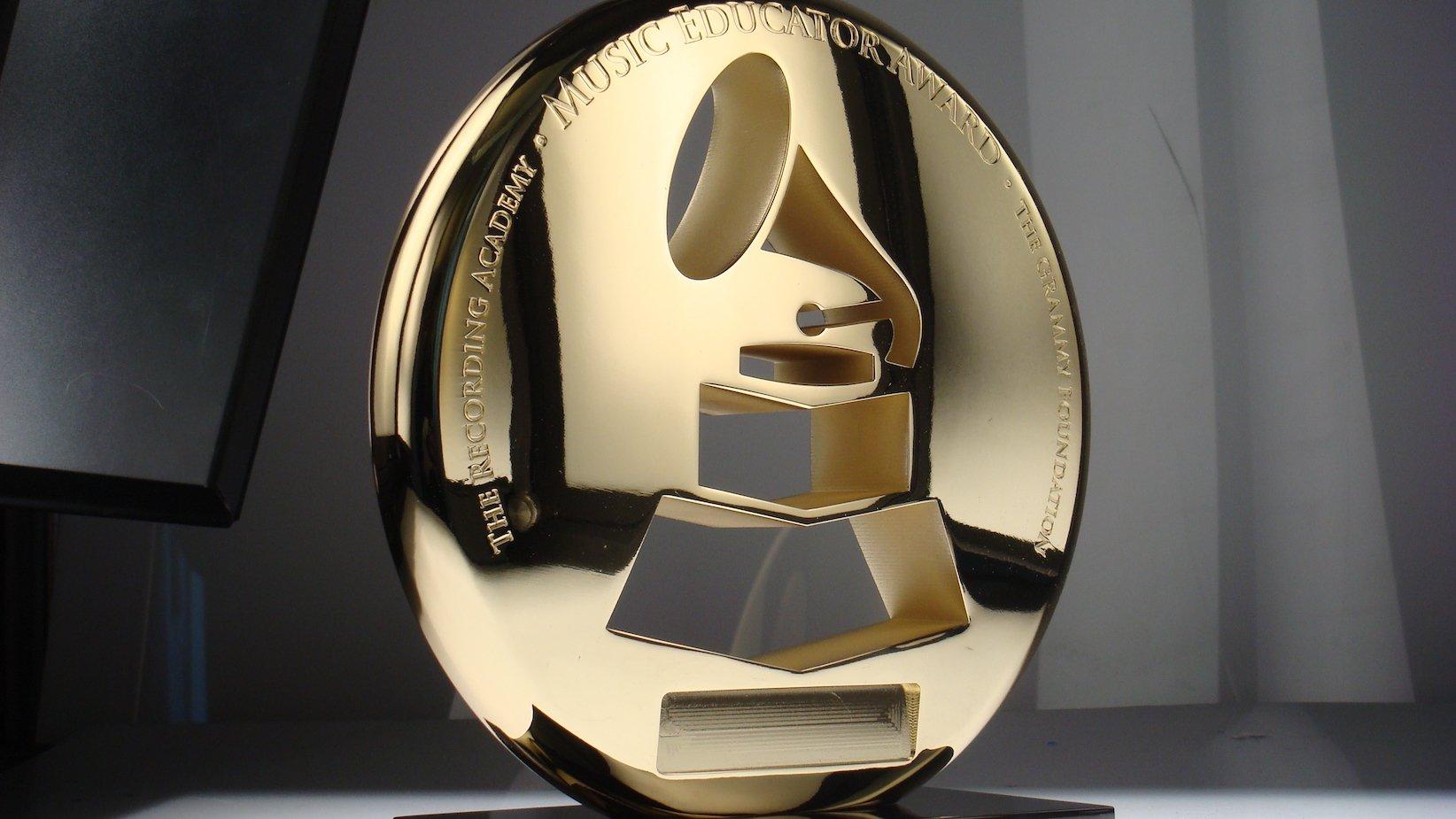
Photo Courtesy of the Recording Academy and GRAMMY Museum
news
25 Semifinalists Announced For The 2024 Music Educator Award
Twenty-five music teachers, from 25 cities across 17 states, have been announced as semifinalists for the 2024 Music Educator Award, presented by the Recording Academy and GRAMMY Museum. One ultimate recipient will be honored during GRAMMY Week 2024.
Twenty-five music teachers have today been announced as semifinalists for the Music Educator Award, an annual award, presented by the Recording Academy and GRAMMY Museum, that supports and celebrates music education and music educators across the U.S. The 25 semifinalists, who hail from 25 cities across 17 states, were selected from a pool of more than 2,000 initial nominations from across all 50 U.S. states. Finalists will be announced in December, and the ultimate recipient of the 2024 Music Educator Award will be recognized during GRAMMY Week 2024, days ahead of the 2024 GRAMMYs.
Nominations for the 2025 Music Educator Award are now open.
Presented by the Recording Academy and GRAMMY Museum, the Music Educator Award recognizes current educators who have made a significant and lasting contribution to the music education field and demonstrate a commitment to the broader cause of maintaining music education in the schools. The Award is open to current U.S. music teachers. Anyone can nominate a teacher — students, parents, friends, colleagues, community members, school deans, and administrators — while teachers are also able to nominate themselves; nominated teachers are notified and invited to fill out an application.
Each year, the recipient of the Music Educator Award, selected from 10 finalists, receives a $10,000 honorarium and matching grant for their school's music program. The nine additional finalists receive a $1,000 honorarium and matching grants. The remaining 15 semifinalists, among the group announced today, will receive a $500 honorarium with matching school grants.
The Music Educator Award program, including honorariums, is made possible by the generosity and support of the Chuck Lorre Family Foundation. In addition, the American Choral Directors Association, National Association for Music Education, NAMM Foundation, and National Education Association support this program through outreach to their constituencies.
Read More: 5 Organizations And Scholarships Supporting Music Education
The full list of the 2024 Music Educator Award semifinalists is as follows:
| Name | School | City | State |
|---|---|---|---|
| Dawn Amthor | Wallkill Senior High School | Wallkill | New York |
| Jeremy Bartunek | Greenbriar School | Northbrook | Illinois |
| William Bennett | Cane Bay High School | Summerville | South Carolina |
| Meg Byrne | Pleasant Valley High School | Bettendorf | Iowa |
| Ernesta Chicklowski | Roosevelt Elementary | Tampa | Florida |
| Michael Coelho | Ipswich Middle and High School | Ipswich | Massachusetts |
| Drew Cowell | Belleville East High School | Belleville | Illinois |
| Marci DeAmbrose | Lincoln Southwest High School | Lincoln | Nebraska |
| Antoine Dolberry | P.S. 103x Hector Fontanez | Bronx | New York |
| Jasmine Fripp | KIPP Nashville Collegiate High School | Nashville | Tennessee |
| J.D. Frizzell | Briarcrest Christian School | Eads | Tennessee |
| Amanda Hanzlik | E.O. Smith High School | Storrs | Connecticut |
| Michael Lapomardo | Shrewsbury High School | Shrewsbury | Massachusetts |
| Ashleigh McDaniel Spatz | Rising Starr Middle School | Fayetteville | Georgia |
| Kevin McDonald | Wellesley High School | Wellesley | Massachusetts |
| Coty Raven Morris | Portland State University | Portland | Oregon |
| Trevor Nicholas | Senn Arts at Nicholas Senn High School | Chicago | Illinois |
| Vicki Nichols | Grandview Elementary | Grandview | Texas |
| Annie Ray | Annandale High School | Annandale | Virginia |
| Bethany Robinson | Noblesville High School | Noblesville | Indiana |
| Danni Schmitt | Roland Park Elementary/Middle School | Baltimore | Maryland |
| Kevin Schoenbach | Oswego High School | Oswego | Illinois |
| Matthew Shephard | Meridian Early College High School | Sanford | Michigan |
| Alice Tsui | New Bridges Elementary | Brooklyn | New York |
| Tammy Yi | Chapman University | Orange | California |
Learn more about the Music Educator Award and apply to the 2025 Music Educator Award program now.
5 Music Teachers Share The Transformative Power Of Music Education
